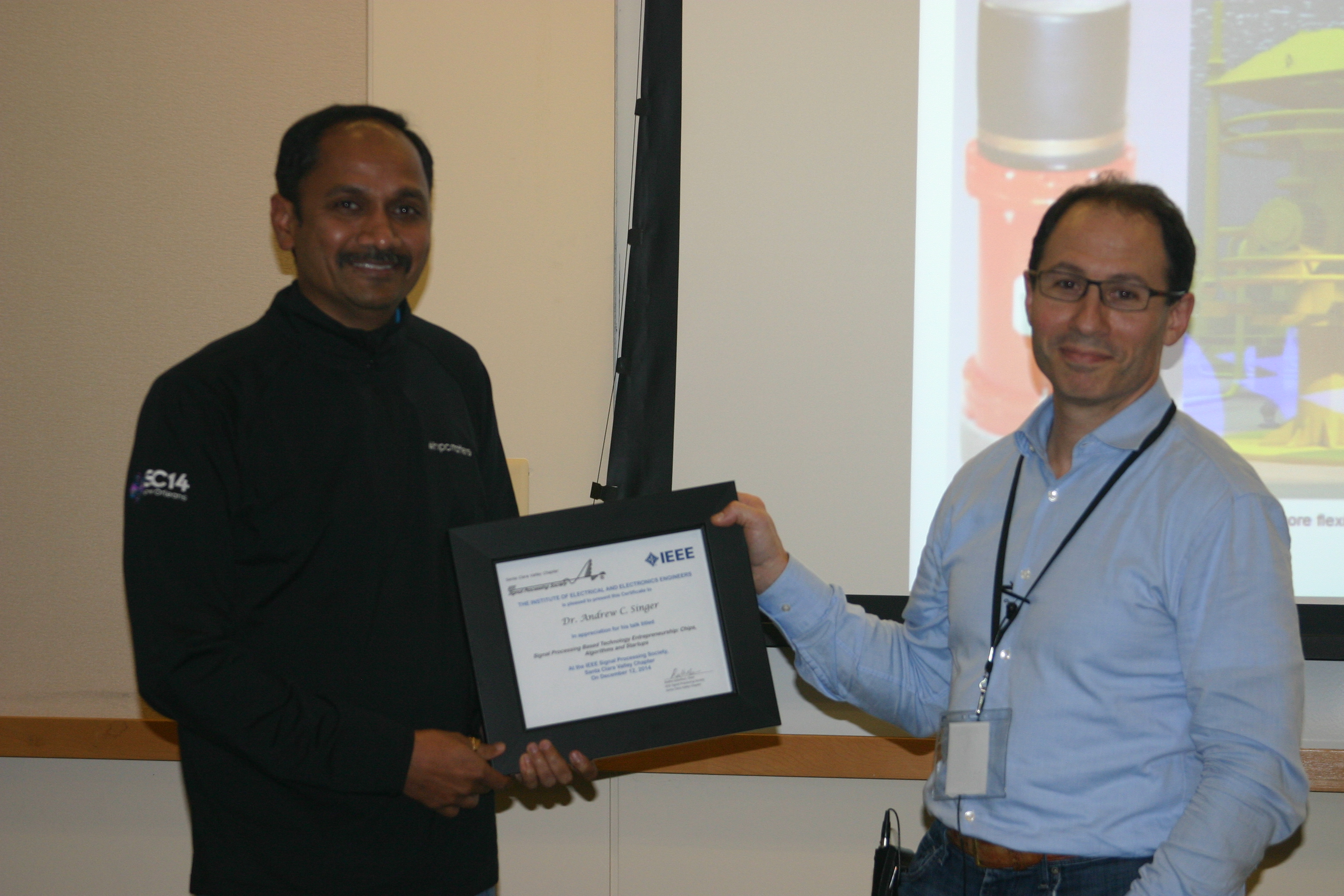|
|
Click here for see the full list of upcoming events.
Thursday, December 04, 2014
Signal Processing-Based Technology Entrepreneurship: Chips, Algorithms, and Startups
Speaker (Distinguished Lecturer):
Dr. Andrew C. Singer
Professor, Dept. Electrical and Computer Engineering
Director, Technology Entrepreneur Center, College of Engineering
University of Illinois at Urbana Champaign
110 CSL, 1308 West Main Street Urbana, IL 61801
Location:
AMD Commons Theater, 991 Stewart Dr., Sunnyvale, CA (map or Google Maps)
Schedule:
6:30pm: Networking/Light Dinner
7:00pm: Announcements
7:05pm: Presentation
8:15pm: Adjourn
Cost:
Free. Donation accepted for food.
Abstract:
Technology commercialization and entrepreneurship are synonymous with engineering in a wide array of contexts, from academic programs at universities, to funding initiatives at the National Science Foundation and discussion of the central role of engineering in the economic future of America by the National Engineering Forum. In this talk, I will discuss the role of engineering entrepreneurship and technology commercialization as a key driver to our economy and as a tremendous source of interesting problems and opportunities for the signal processing community. In the first half of the talk, I will draw on my experience as Director of the Technology Entrepreneur Center at the University of Illinois over the last decade, and discuss the evolution of technology entrepreneurship as a central focus of engineering programs at Illinois and across the country. In the second half of the talk, I will discuss how signal processing played a critical role in a number of startup companies, including my experience in two that emerged from my research group at Illinois. These include an optical semiconductor company that was the first to employ DSP-enhanced receivers for 10Gbps optical communications, leading to the world's fastest implementation of the Viterbi algorithm; and at the other end of the spectral extreme, an underwater acoustic communications company commercializing the first video-capable deep-sea wireless modems for the oil and gas industry. These two companies were driven by signal processing solutions to some of the most challenging digital communications channels on the planet.
Biography:
Andrew C. Singer received the S.B., S.M., and Ph.D. degrees, all in electrical engineering and computer science, from the Massachusetts Institute of Technology. From 1996 to 1998, he was a Research Scientist at Sanders, A Lockheed Martin Company in Manchester, New Hampshire. Since 1998, he has been on the faculty of the Department of Electrical and Computer Engineering at the University of Illinois at Urbana-Champaign, where he currently holds a Fox Family Professorship in the Electrical and Computer Engineering department. His research interests include signal processing and communication systems.
In 2000, he co-founded Intersymbol Communications, Inc., a fabless semiconductor IC company, based in Champaign, Illinois, which built the world's fastest signal-processing-enhanced receivers for 10Gb/s optical communications. In 2007, Intersymbol Communications, Inc. was acquired by Finisar Corporation (FNSR). He continues to work in areas related to signal processing algorithms and their potential to enhance mixed-signal analog and digital circuits both in his research and as Assistant Director of the SRC-funded Systems On Nanoscale Information fabriCs (SONIC) center. In 2014, he co-founded OceanComm, a provider of underwater acoustic modem technology for the subsea oil and gas industry.
He received the National Science Foundation CAREER Award in 2000; in 2001 he received the Xerox Faculty Research Award, and in 2002 he was named a Willett Faculty Scholar. In 2005, he was appointed the Director of the Technology Entrepreneur Center at the University of Illinois, where he directs a wide range of entrepreneurship activities in the College of Engineering. In 2006 he received the IEEE Journal of Solid State Circuits Best Paper Award for the paper entitled "An MLSE Receiver for Electronic Dispersion Compensation of OC-192 Fiber Links." In 2008, he received the IEEE Signal Processing Magazine Award for the paper entitled "Turbo Equalization." In 2009, he was elected Fellow of the IEEE "for contributions to signal processing techniques for digital communication," and in 2014, he was named as a Distinguished Lecturer of the IEEE Signal Processing Society.

* from-left: Radhakrishna Giduthuri, Andrew Singer
Subscribe to future announcements: link
|